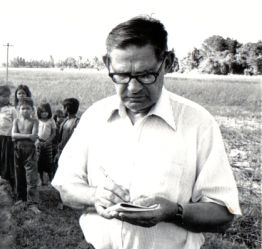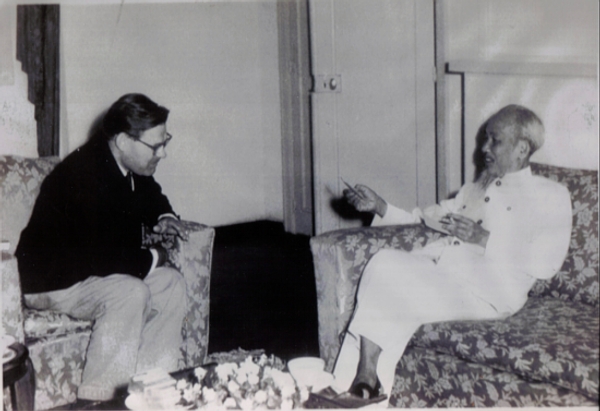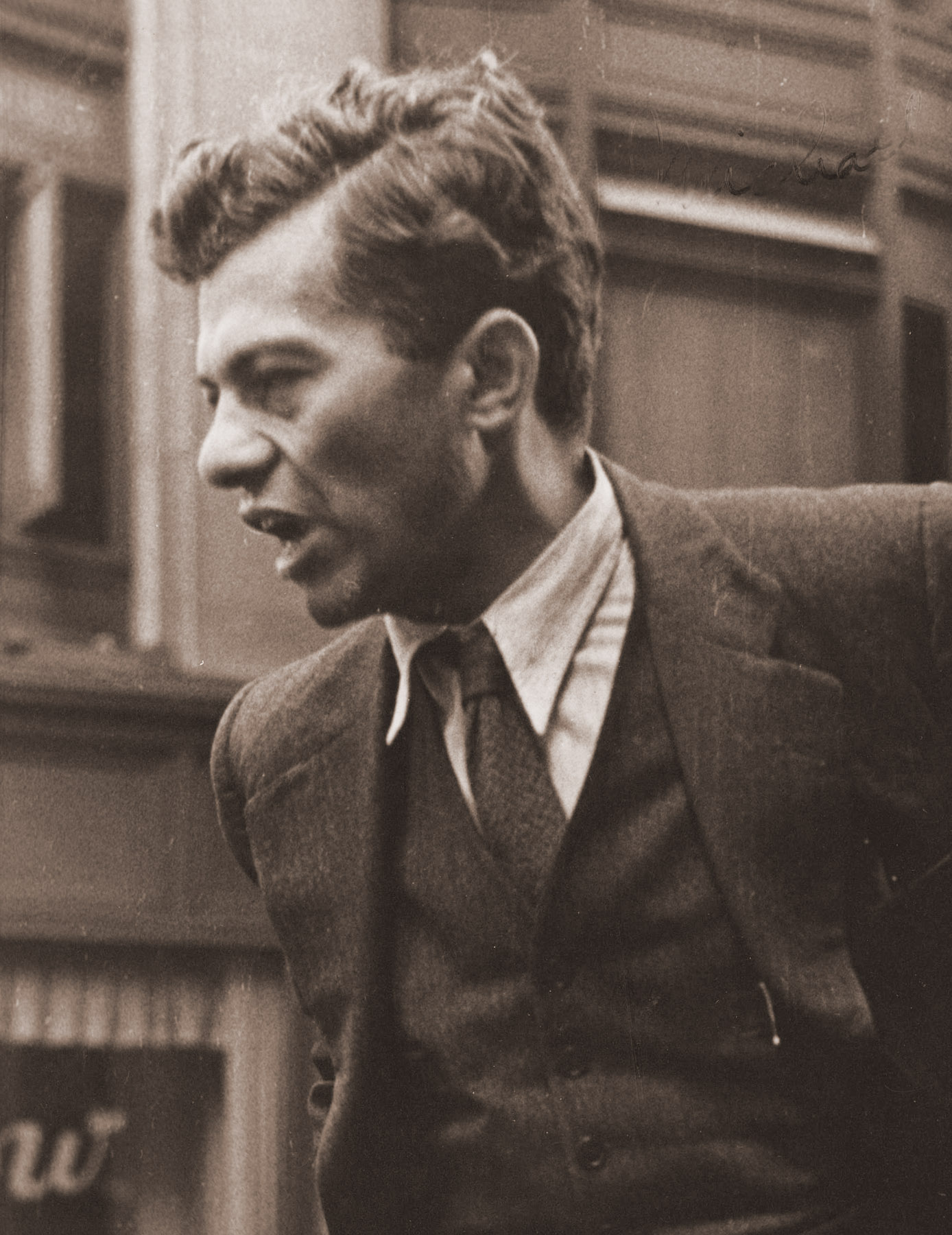Phillip Bonosky on:
[Wikipedia]
[Google]
[Amazon]
 Phillip Bonosky (March 7, 1916 – March 2, 2013) was an American novelist, journalist, and labor activist. A lifelong Communist, he wrote the
Phillip Bonosky (March 7, 1916 – March 2, 2013) was an American novelist, journalist, and labor activist. A lifelong Communist, he wrote the
 While in
While in  Friend and, for a time, fellow Communist Party member
Friend and, for a time, fellow Communist Party member
 Bonosky published his first novel, '' Burning Valley,'' in 1953, and contributed to the literary journal ''
Bonosky published his first novel, '' Burning Valley,'' in 1953, and contributed to the literary journal ''
 Phillip Bonosky (March 7, 1916 – March 2, 2013) was an American novelist, journalist, and labor activist. A lifelong Communist, he wrote the
Phillip Bonosky (March 7, 1916 – March 2, 2013) was an American novelist, journalist, and labor activist. A lifelong Communist, he wrote the coming-of-age novel
In literary criticism, a ''Bildungsroman'' (, plural ''Bildungsromane'', ) is a literary genre that focuses on the psychological and moral growth of the protagonist from childhood to adulthood ( coming of age), in which character change is imp ...
'' Burning Valley'' and worked as cultural editor and Moscow
Moscow ( , US chiefly ; rus, links=no, Москва, r=Moskva, p=mɐskˈva, a=Москва.ogg) is the capital and largest city of Russia. The city stands on the Moskva River in Central Russia, with a population estimated at 13.0 million ...
correspondent for the '' Daily World.'' Bonosky was one of the first U.S. journalists to visit communist China
China, officially the People's Republic of China (PRC), is a country in East Asia. It is the world's most populous country, with a population exceeding 1.4 billion, slightly ahead of India. China spans the equivalent of five time zones and ...
and one of the few to interview Vietnamese revolutionary leader Ho Chi Minh
(: ; born ; 19 May 1890 – 2 September 1969), commonly known as ('Uncle Hồ'), also known as ('President Hồ'), (' Old father of the people') and by other aliases, was a Vietnamese revolutionary and statesman. He served as Prime ...
.
Background
Bonosky was born in 1916 inDuquesne, Pennsylvania
Duquesne ( ) is a city along the Monongahela River in Allegheny County, Pennsylvania, United States, within the Pittsburgh metropolitan area. The population was 5,254 at the 2020 census.
History
The city of Duquesne was settled in 1789 and incor ...
, the fourth of eight children, to Lithuanian
Lithuanian may refer to:
* Lithuanians
* Lithuanian language
* The country of Lithuania
* Grand Duchy of Lithuania
* Culture of Lithuania
* Lithuanian cuisine
* Lithuanian Jews as often called "Lithuanians" (''Lita'im'' or ''Litvaks'') by other Jew ...
immigrant parents.
Early career
As an adolescent he worked in the Duquesne Steel Works, but lost his job in theGreat Depression
The Great Depression (19291939) was an economic shock that impacted most countries across the world. It was a period of economic depression that became evident after a major fall in stock prices in the United States. The economic contagio ...
and left home to find work. Norman Markowitz writes, "Bonosky joined large numbers of unemployed youth to ride the rails in the early 1930s, and eventually found himself in Washington, DC, living in a warehouse for transients that the early Roosevelt administration had provided."
Social activism
 While in
While in Washington, D.C.
)
, image_skyline =
, image_caption = Clockwise from top left: the Washington Monument and Lincoln Memorial on the National Mall, United States Capitol, Logan Circle, Jefferson Memorial, White House, Adams Morgan, ...
, Bonosky befriended the social worker Ann Terry White, wife of Treasury Department official Harry Dexter White
Harry Dexter White (October 29, 1892 – August 16, 1948) was a senior U.S. Treasury department official. Working closely with the Secretary of the Treasury Henry Morgenthau Jr., he helped set American financial policy toward the Allies of World W ...
. With her financial assistance, Bonosky enrolled in Wilson Teachers College
The University of the District of Columbia (UDC) is a public historically black land-grant university in Washington, D.C. It was established in 1851 and is the only public university in the city. UDC is a member school of the Thurgood Marshall C ...
and soon joined the Communist Party USA
The Communist Party USA, officially the Communist Party of the United States of America (CPUSA), is a communist party in the United States which was established in 1919 after a split in the Socialist Party of America following the Russian Revo ...
. (In 1948, when Harry Dexter White was investigated by the House Committee on Un-American Activities
The House Committee on Un-American Activities (HCUA), popularly dubbed the House Un-American Activities Committee (HUAC), was an investigative committee of the United States House of Representatives, created in 1938 to investigate alleged disloy ...
(HUAC) for possible Communist ties, letters exchanged between his wife and Bonosky were seized by government investigators as evidence against him.) In 1940, as President of the Washington division of the Workers Alliance of America
The Workers Alliance of America (WAA) was a Popular Front era political organization established in March 1935 in the United States which united several efforts to mobilize unemployed workers under a single banner. Founded by the Socialist Party of ...
, Bonosky worked for the American Peace Committee to stop US entry into World War 2. He met with Eleanor Roosevelt
Anna Eleanor Roosevelt () (October 11, 1884November 7, 1962) was an American political figure, diplomat, and activist. She was the first lady of the United States from 1933 to 1945, during her husband President Franklin D. Roosevelt's four ...
to discuss government cuts in Works Progress Administration
The Works Progress Administration (WPA; renamed in 1939 as the Work Projects Administration) was an American New Deal agency that employed millions of jobseekers (mostly men who were not formally educated) to carry out public works projects, i ...
programs, an event that was reported in the press. When the American Peace Committee changed its name to the American People’s Committee in June 1941, and advocated US entry into the war, Bonosky worked for war aid to the Soviet Union. By the time the U.S. entered World War II
World War II or the Second World War, often abbreviated as WWII or WW2, was a world war that lasted from 1939 to 1945. It involved the vast majority of the world's countries—including all of the great powers—forming two opposin ...
, Bonosky was a full-time organizer for the Communist Party. Bonosky would go on to become one of the leading voices in the Party, described by it as ‘fighting for the rights of working-class people’.
 Friend and, for a time, fellow Communist Party member
Friend and, for a time, fellow Communist Party member Angela Davis
Angela Yvonne Davis (born January 26, 1944) is an American political activist, philosopher, academic, scholar, and author. She is a professor at the University of California, Santa Cruz. A feminist and a Marxist, Davis was a longtime member of ...
quoted Bonosky as giving his view of the period. He said that the 1930s were a "watershed in the American democratic tradition. It is a period which will continue to serve both the present and the future as a reminder and an example of how an aroused people, led and spurred on by the working-class, can change the entire complexion of the culture of a nation."
In 1948, Bonosky began a lifelong friendship with the painter Alice Neel
Alice Neel (January 28, 1900 – October 13, 1984) was an American visual artist, who was known for her portraits depicting friends, family, lovers, poets, artists, and strangers. Her paintings have an expressionistic use of line and color, psyc ...
, detailed in the 2007 documentary film ''Alice Neel'' and in the Neel biography ''Alice Neel: The Art of Not Sitting Pretty'' by Phoebe Hoban
Phoebe Hoban is an American journalist perhaps known best for her biographies of the artists Jean Michel Basquiat ('' Basquiat: A Quick Killing in Art'', Viking 1998) and Alice Neel (''Alice Neel: The Art of not Sitting Pretty'', St. Martin's Pres ...
. Hoban describes the first meeting between Bonosky and Neel: "Bonosky first met Neel at the offices of ''Masses & Mainstream,'' where he was an editor (as was Mike Gold
Michael Gold (April 12, 1894 – May 14, 1967) was the pen-name of Jewish American writer Itzok Isaac Granich. A lifelong communist, Gold was a novelist and literary critic. His semi-autobiographical novel '' Jews Without Money'' (1930) was a bes ...
). Neel asked him to sit for a portrait, and in early March 1948, he came up to her apartment every afternoon for a week, posing between one and four." Bonosky later organized an exhibition of Neel's paintings in Moscow
Moscow ( , US chiefly ; rus, links=no, Москва, r=Moskva, p=mɐskˈva, a=Москва.ogg) is the capital and largest city of Russia. The city stands on the Moskva River in Central Russia, with a population estimated at 13.0 million ...
.
Death
Bonosky died age 96 on March 2, 2013, inBrooklyn, New York
Brooklyn () is a borough of New York City, coextensive with Kings County, in the U.S. state of New York. Kings County is the most populous county in the State of New York, and the second-most densely populated county in the United States, be ...
.
Works
 Bonosky published his first novel, '' Burning Valley,'' in 1953, and contributed to the literary journal ''
Bonosky published his first novel, '' Burning Valley,'' in 1953, and contributed to the literary journal ''Masses & Mainstream
''Masses & Mainstream'', published from 1948 to 1963, was an American Marxist monthly publication. It resulted from a merger between ''New Masses'', which ceased publication in January 1948, and ''Mainstream'', a Communist cultural quarterly establ ...
'' throughout the 1950s. His second novel, ''The Magic Fern
''The Magic Fern'' is a 1961 novel by the American writer Phillip Bonosky, set in the steel valley of Pittsburgh, Pennsylvania during the 1950s.
Plot
A militant worker named Leo returns to his Pennsylvania hometown, where after the Korean War th ...
,'' was published in 1960. In the 1960s, Bonosky interviewed Vietnamese president Ho Chi Minh
(: ; born ; 19 May 1890 – 2 September 1969), commonly known as ('Uncle Hồ'), also known as ('President Hồ'), (' Old father of the people') and by other aliases, was a Vietnamese revolutionary and statesman. He served as Prime ...
and became cultural editor for the Communist Party newspaper ''Daily World.'' He interviewed Afghan leaders in the 1980s, and was one of the first Western journalists to visit Cambodia
Cambodia (; also Kampuchea ; km, កម្ពុជា, UNGEGN: ), officially the Kingdom of Cambodia, is a country located in the southern portion of the Indochinese Peninsula in Southeast Asia, spanning an area of , bordered by Thailand t ...
after the removal of the Khmer Rouge
The Khmer Rouge (; ; km, ខ្មែរក្រហម, ; ) is the name that was popularly given to members of the Communist Party of Kampuchea (CPK) and by extension to the regime through which the CPK ruled Cambodia between 1975 and 1979. ...
. He has published several collections of his work, including ''Beyond the Borders of Myth: From Vilnius to Hanoi'' (1967), ''Afghanistan: Washington’s Secret War'' (1985), ''Devils in Amber: The Baltics'' (1992. He published a collection of short stories, ''A Bird in Her Hair,'' in 1987.
His literary agent was Maxim Lieber
Maxim Lieber (October 15, 1897 – April 10, 1993) was a prominent American literary agent in New York City during the 1930s and 1940s. The Soviet spy Whittaker Chambers named him as an accomplice in 1949, and Lieber fled first to Mexico and then ...
.
'' Burning Valley'' is a 1953 coming-of-age novel
In literary criticism, a ''Bildungsroman'' (, plural ''Bildungsromane'', ) is a literary genre that focuses on the psychological and moral growth of the protagonist from childhood to adulthood ( coming of age), in which character change is imp ...
set in the steel valley of Pittsburgh, Pennsylvania
Pittsburgh ( ) is a city in the Commonwealth (U.S. state), Commonwealth of Pennsylvania, United States, and the county seat of Allegheny County, Pennsylvania, Allegheny County. It is the most populous city in both Allegheny County and Wester ...
during the 1920s. It tells the story of Benedict Bulmanis, son of an immigrant Lithuanian steelworker, who feels called to the Roman Catholic priesthood, but is torn by local political events as steelworkers struggle to organize in the face of corporate expansion. The novel is largely based on Bonosky’s own life and that of his father, both of whom worked in steel mills. While the novel received praise throughout the Soviet Union
The Soviet Union,. officially the Union of Soviet Socialist Republics. (USSR),. was a transcontinental country that spanned much of Eurasia from 1922 to 1991. A flagship communist state, it was nominally a federal union of fifteen national ...
, China, and other socialist countries, it received little attention in the U.S. French writer and philosopher Simone de Beauvoir
Simone Lucie Ernestine Marie Bertrand de Beauvoir (, ; ; 9 January 1908 – 14 April 1986) was a French existentialist philosopher, writer, social theorist, and feminist activist. Though she did not consider herself a philosopher, and even th ...
said, "I love very much the novel ''Burning Valley'': It is rare to find a good book about the working class written by one of them." Author and literary critic Mike Gold
Michael Gold (April 12, 1894 – May 14, 1967) was the pen-name of Jewish American writer Itzok Isaac Granich. A lifelong communist, Gold was a novelist and literary critic. His semi-autobiographical novel '' Jews Without Money'' (1930) was a bes ...
wrote, "This novel ... adds a burning page to the story of the immigrant workers who built the heavy industry of America."
;Books
* ''Burning Valley'' (1953)
* ''The Magic Fern'' (1960
* ''Beyond the Borders of Myth: From Vilnius to Hanoi'' (1967)
* ''Afghanistan: Washington’s Secret War'' (1985)
* ''A Bird in Her Hair'' (1987))
* ''Devils in Amber: The Baltics'' (1992)
References
{{DEFAULTSORT:Bonosky, Phillip American male novelists 1916 births 2013 deaths 20th-century American novelists 20th-century American male writers American Communist writers